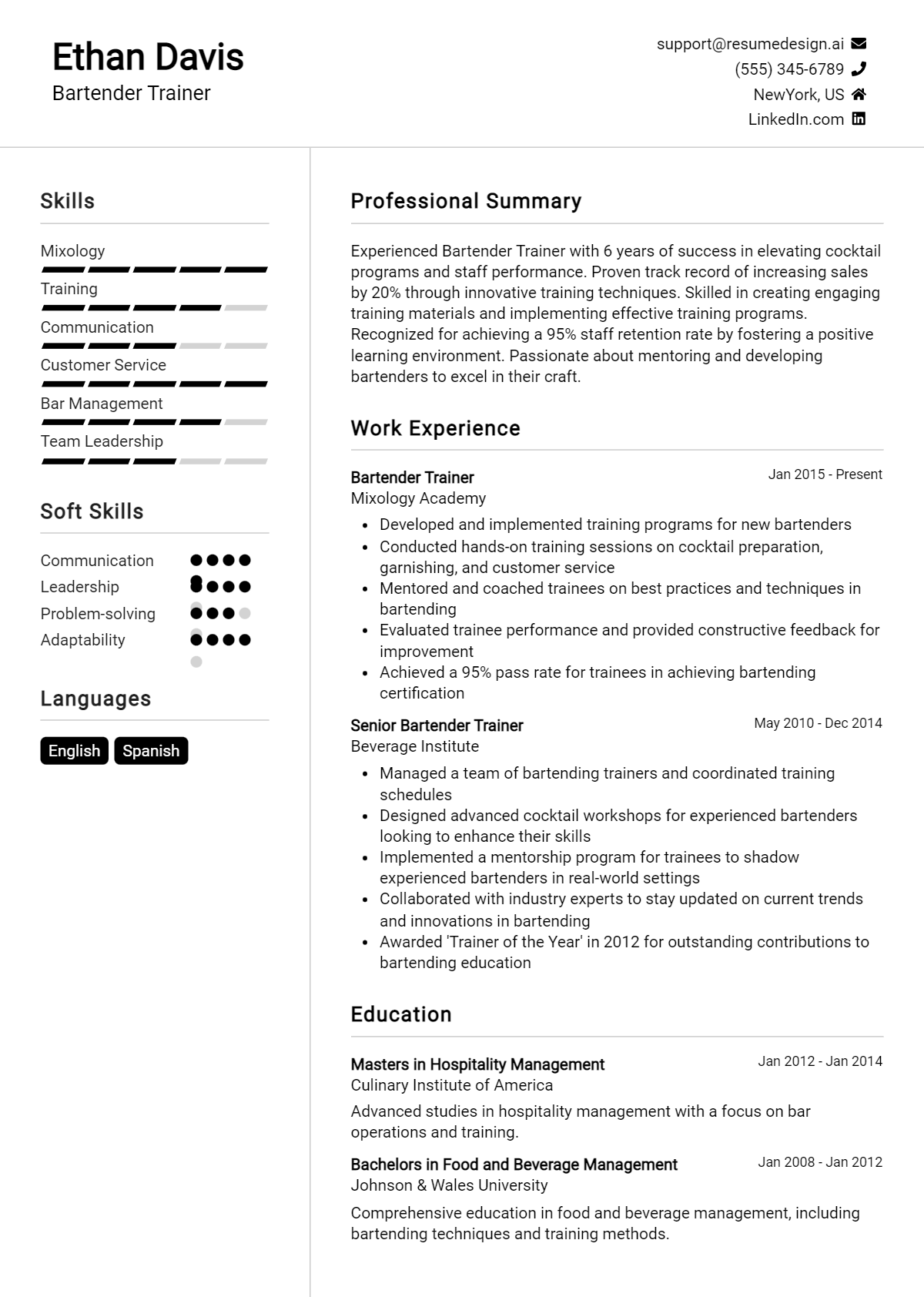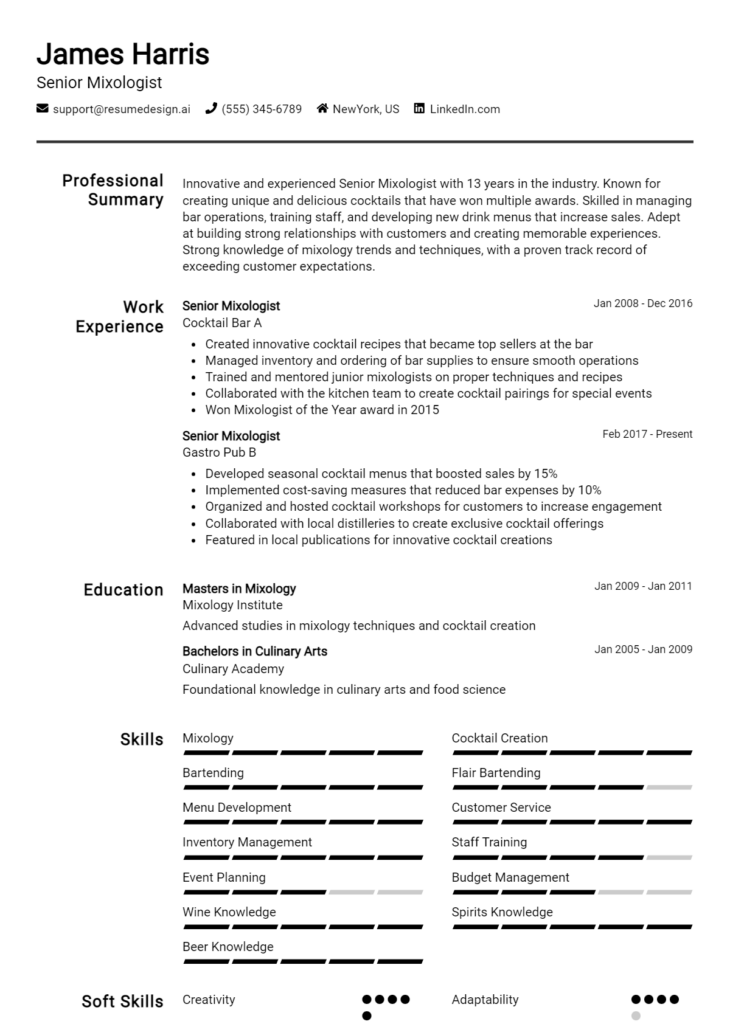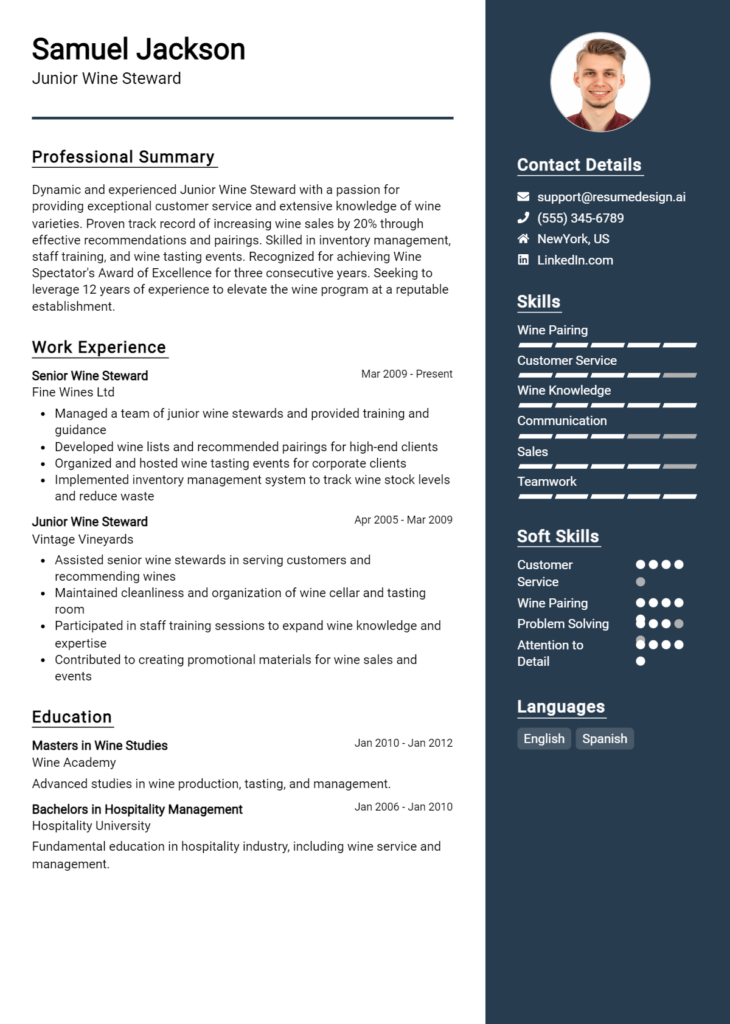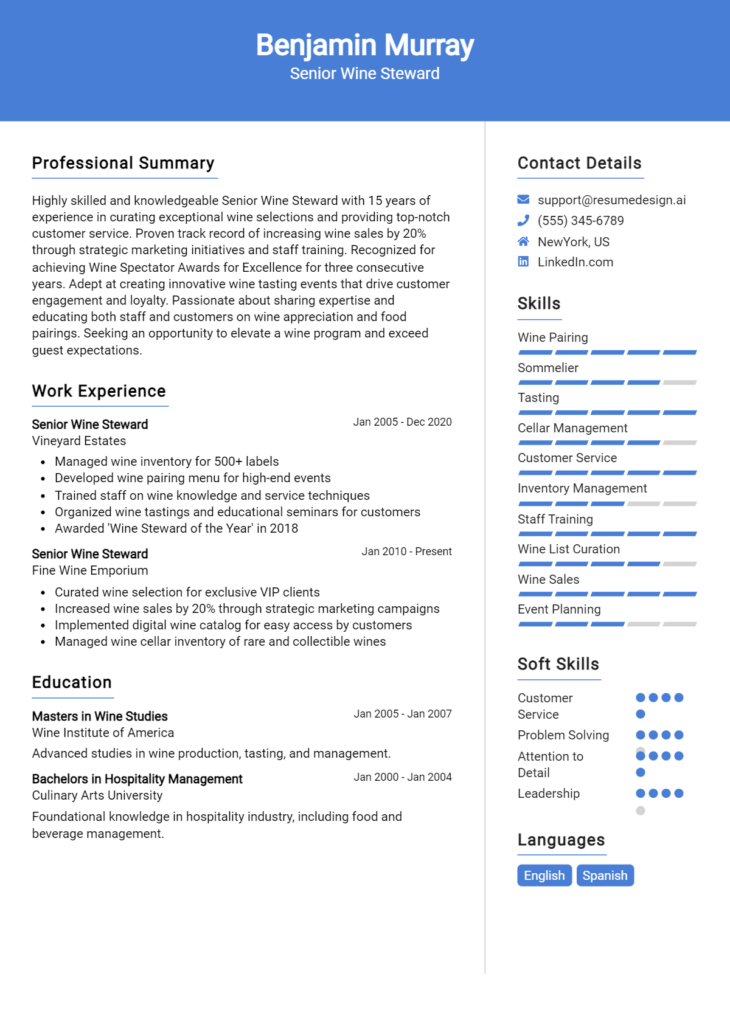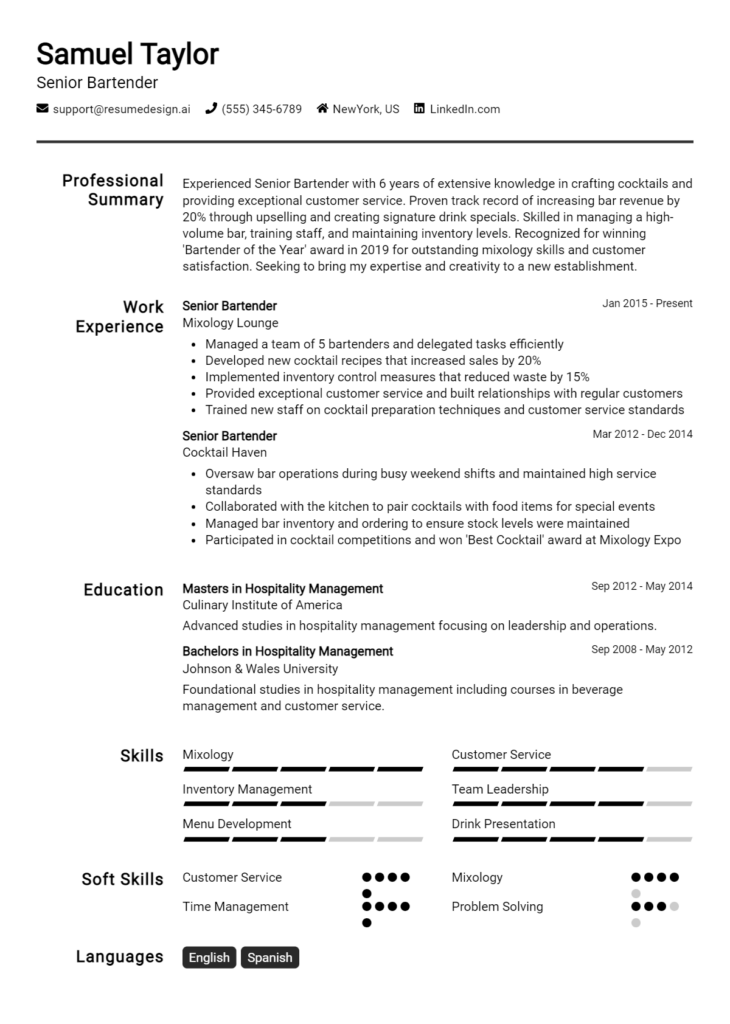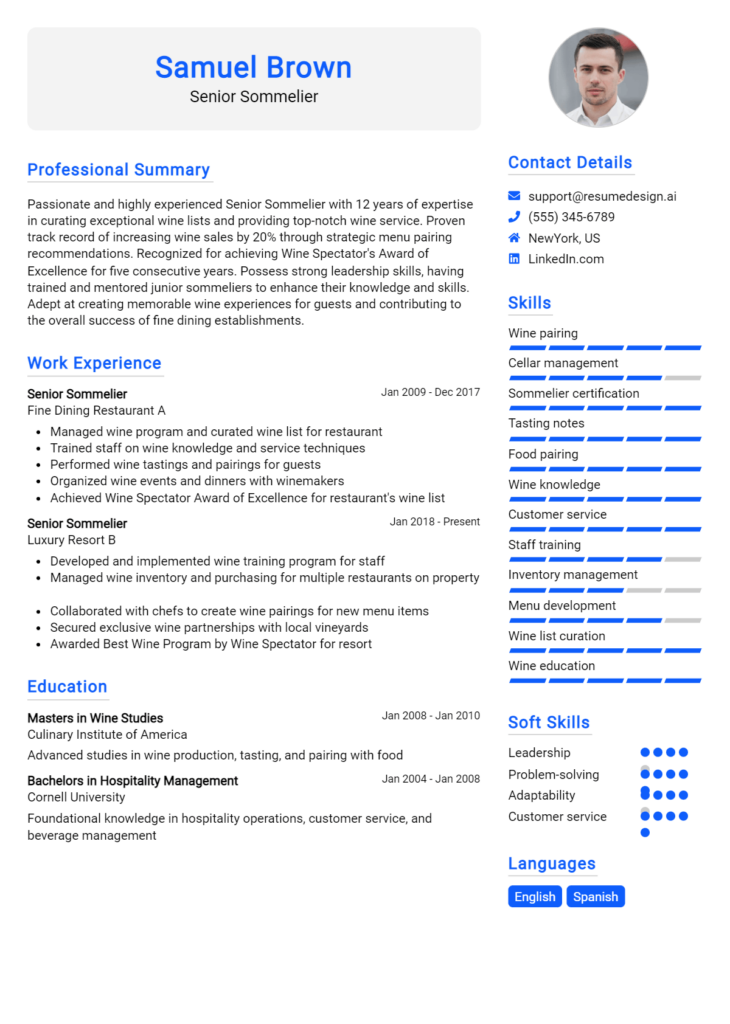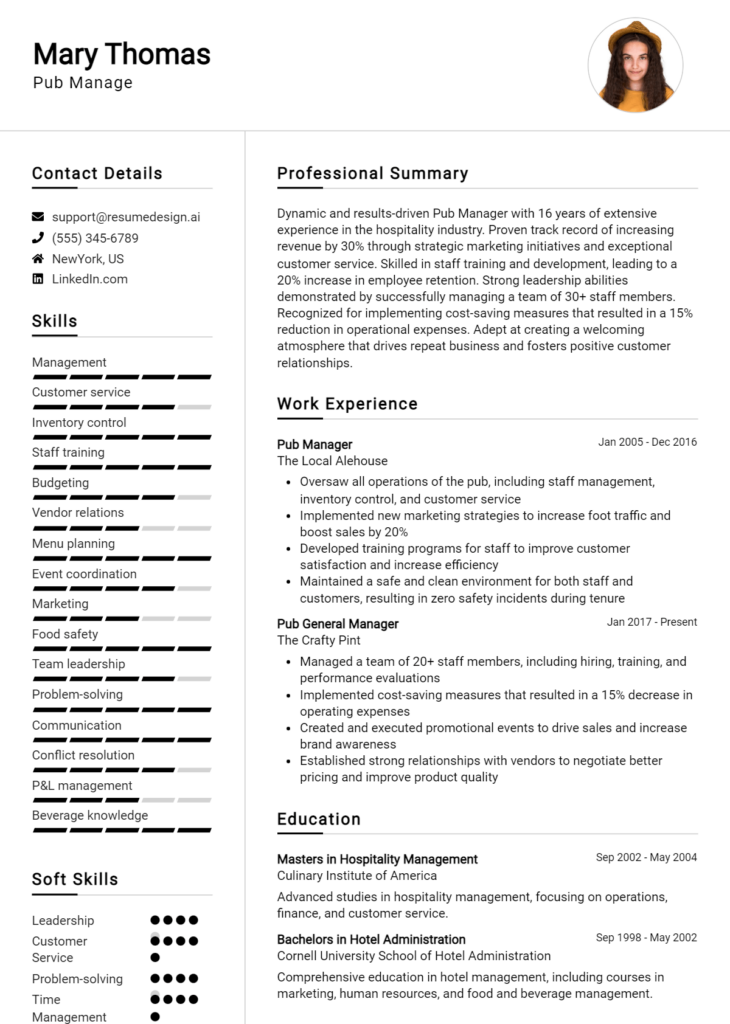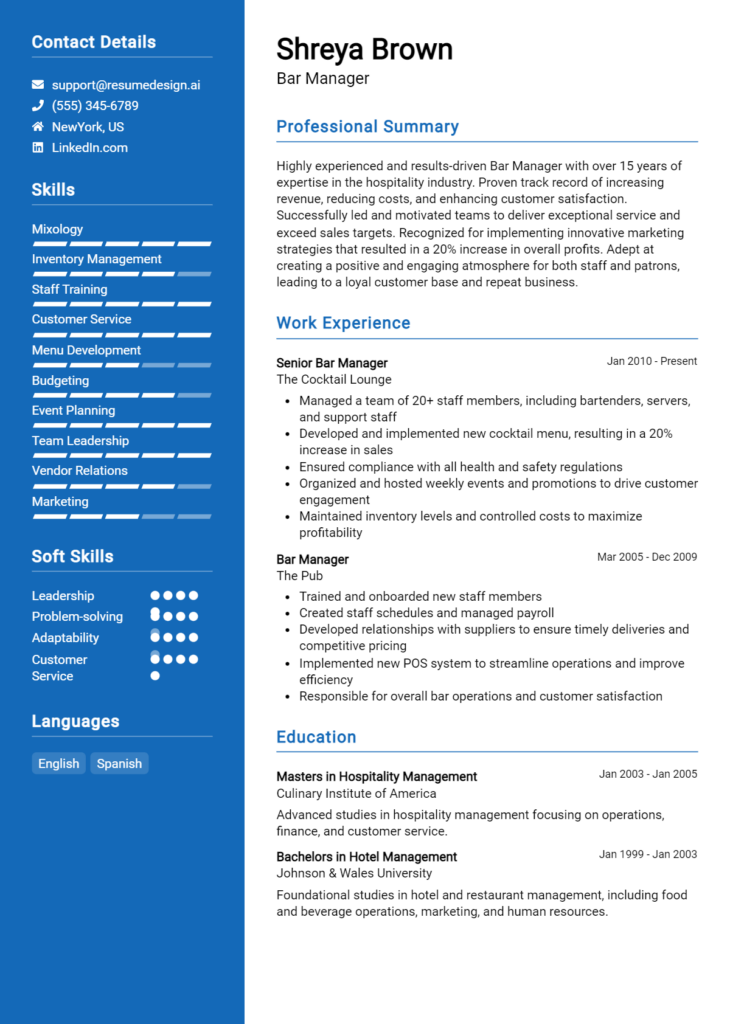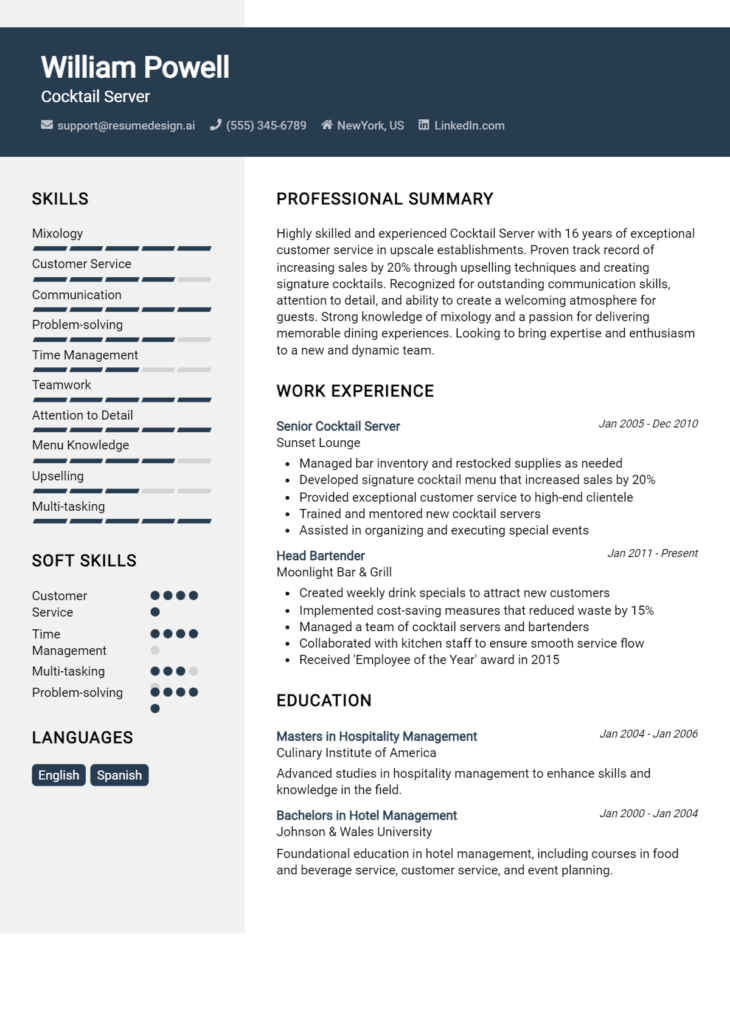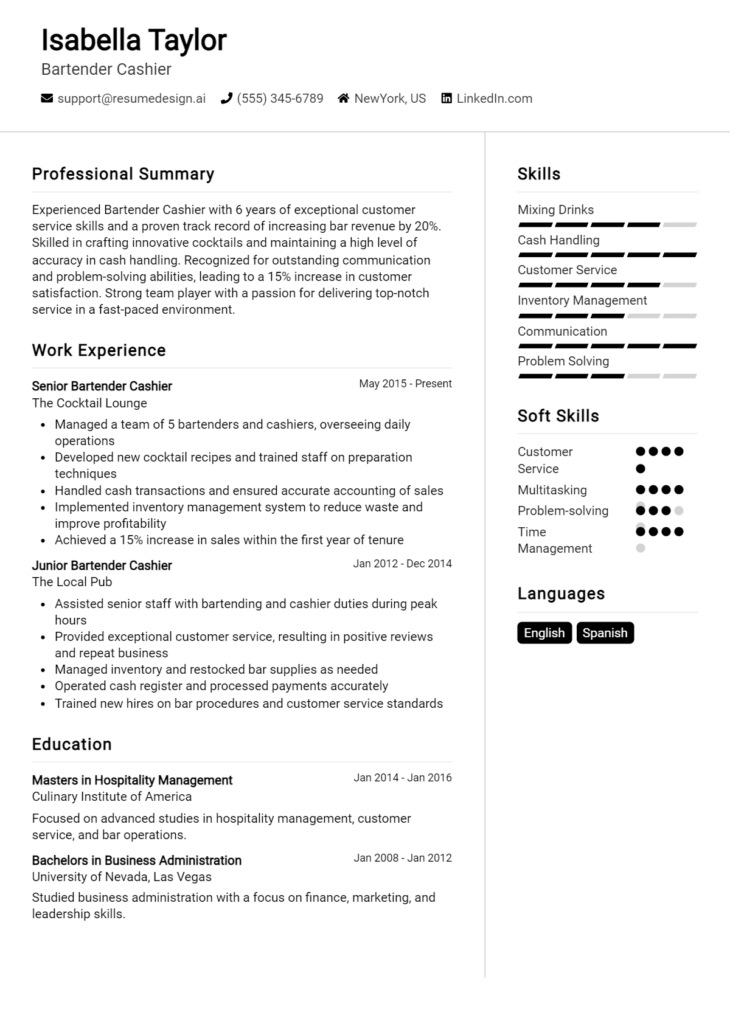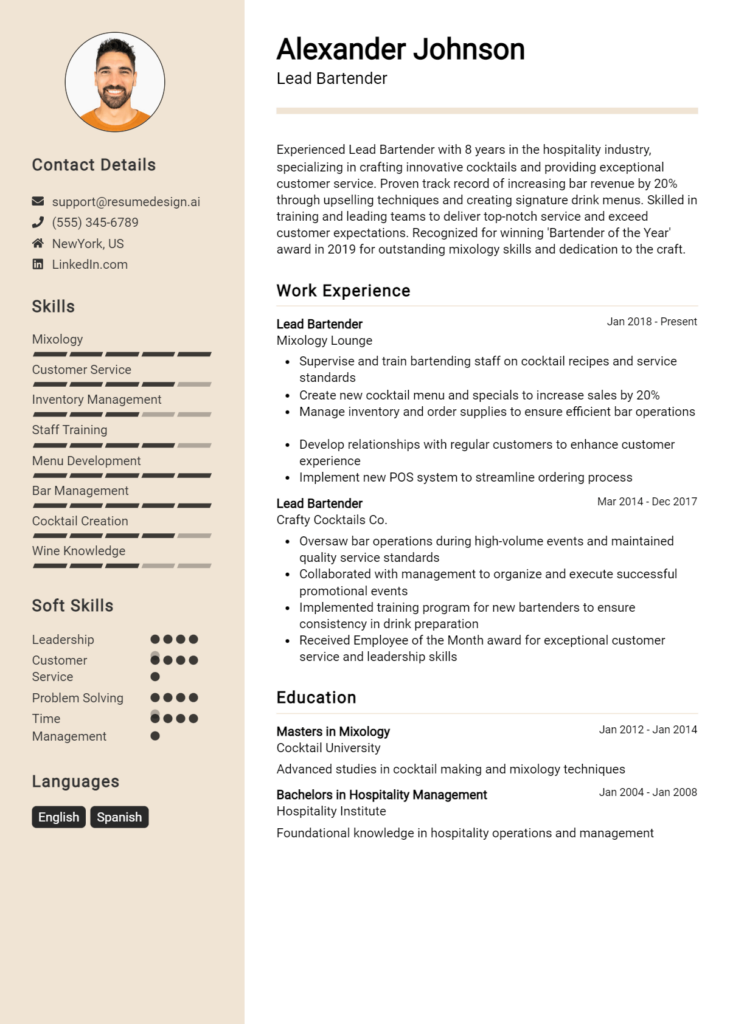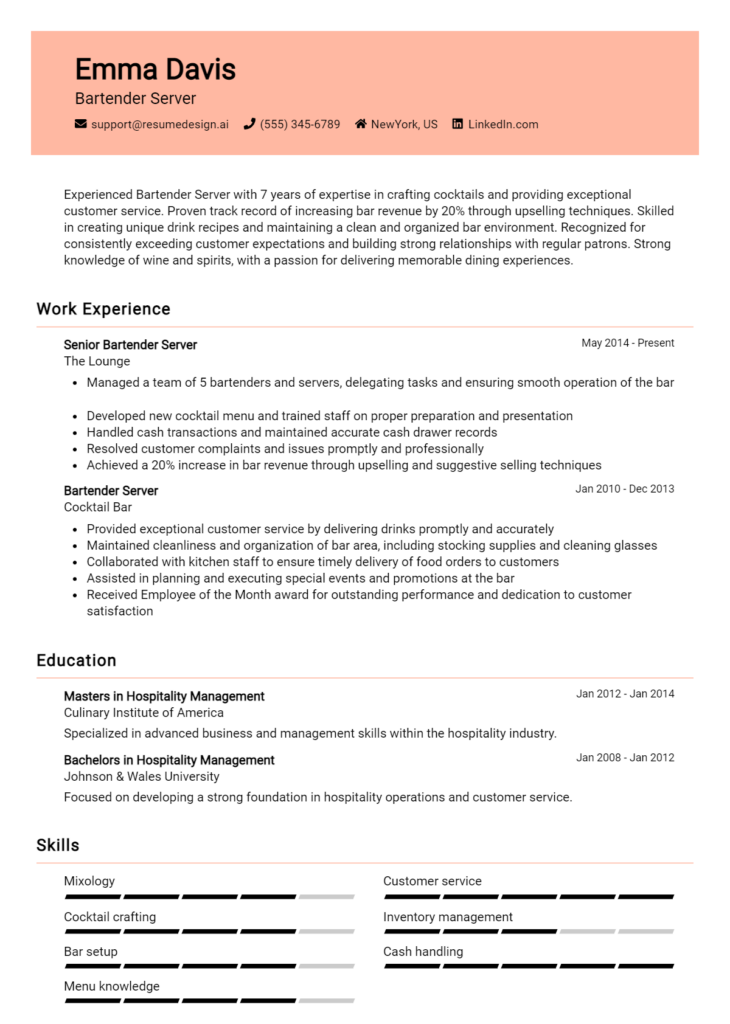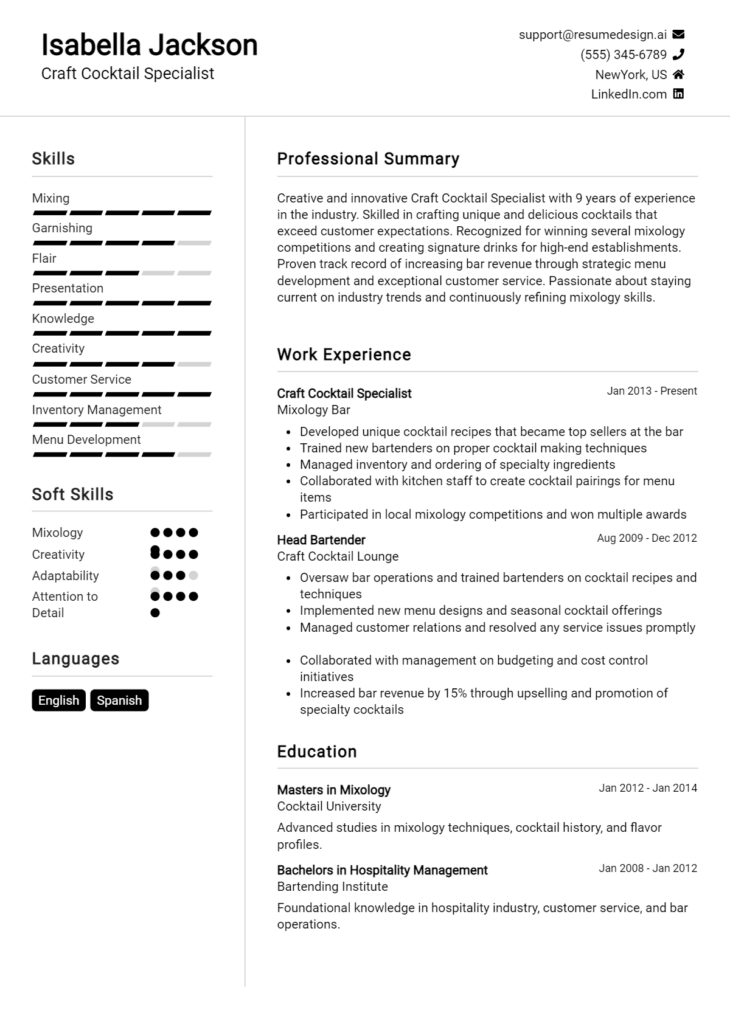Bartender Trainer Core Responsibilities
A Bartender Trainer is pivotal in bridging the gap between management and staff, ensuring a cohesive operation within the hospitality industry. Key responsibilities include developing training materials, conducting workshops, and assessing bartender skills. Essential skills encompass technical knowledge of mixology, operational efficiency, and strong problem-solving abilities to address challenges on the floor. These competencies not only enhance individual performance but also align with the organization's overarching goals. A well-structured resume can effectively highlight these qualifications, showcasing the candidate’s potential impact.
Common Responsibilities Listed on Bartender Trainer Resume
- Create and implement comprehensive training programs for new bartenders.
- Conduct hands-on training sessions and skill assessments.
- Develop engaging instructional materials and manuals.
- Monitor and evaluate bartender performance and provide constructive feedback.
- Ensure adherence to safety and sanitation standards.
- Collaborate with management to address operational challenges.
- Stay updated on industry trends and cocktail recipes.
- Facilitate team-building exercises to promote a positive work environment.
- Assist in inventory management and ordering supplies.
- Provide ongoing support and mentorship to bartenders.
- Organize and lead tastings and product knowledge sessions.
High-Level Resume Tips for Bartender Trainer Professionals
In the competitive world of bartending, a well-crafted resume is essential for Bartender Trainer professionals seeking to make a lasting impression on potential employers. Your resume is often the first glimpse hiring managers have of your skills, experience, and achievements, making it a critical tool in showcasing your expertise in training and development. It needs to reflect not only your bartending prowess but also your ability to educate and inspire others in the craft. This guide will provide practical and actionable resume tips specifically tailored for Bartender Trainer professionals to help you stand out in a crowded job market.
Top Resume Tips for Bartender Trainer Professionals
- Tailor your resume for each job application by aligning your skills and experiences with the specific job description.
- Highlight relevant bartending and training experience, including any certifications or specialized training you’ve completed.
- Quantify your achievements, such as the number of trainees you've successfully trained or improvements in bar sales during your tenure.
- Showcase industry-specific skills, including cocktail knowledge, customer service excellence, and team leadership capabilities.
- Incorporate keywords from the job posting to pass through applicant tracking systems and grab the attention of hiring managers.
- Use action verbs to describe your responsibilities and accomplishments, emphasizing your proactive approach to training.
- Include a section for professional development, showcasing any workshops, seminars, or courses related to bartending and training.
- Keep your resume to one page, ensuring it is concise and focused on the most relevant information.
- Proofread your resume carefully to eliminate any spelling or grammatical errors that could detract from your professionalism.
- Utilize a clean and visually appealing format that makes your resume easy to read and navigate.
By implementing these tips, you can significantly increase your chances of landing a job in the Bartender Trainer field. A polished and tailored resume will not only highlight your qualifications but also demonstrate your commitment to excellence in both bartending and training, making you an attractive candidate for potential employers.
Why Resume Headlines & Titles are Important for Bartender Trainer
In the competitive landscape of the hospitality industry, the role of a Bartender Trainer is crucial in shaping skilled bartenders who provide exceptional service. A resume headline or title is an essential component of a Bartender Trainer's resume, as it serves as the first impression for hiring managers. A strong headline can instantly capture attention and succinctly convey a candidate's key qualifications, making it easier for employers to assess their fit for the role. It should be concise, relevant, and directly aligned with the specific job being applied for, ensuring that it resonates with the expectations of potential employers.
Best Practices for Crafting Resume Headlines for Bartender Trainer
- Keep it concise—aim for one impactful phrase.
- Use role-specific terminology that aligns with the job description.
- Highlight key skills or achievements relevant to bartender training.
- Consider including years of experience or certifications.
- Use action-oriented language to convey dynamism.
- Avoid generic phrases; make it unique to you.
- Tailor the headline for each job application to match specific requirements.
- Ensure it is easily readable and stands out visually on the resume.
Example Resume Headlines for Bartender Trainer
Strong Resume Headlines
Dynamic Bartender Trainer with 10+ Years of Experience in Craft Cocktail Creation
Award-Winning Bartender Trainer Specializing in Mixology and Customer Service Excellence
Certified Bartender Trainer with Proven Success in Team Development and Talent Retention
Expert in Beverage Management and Bartending Techniques, Ready to Elevate Your Team
Weak Resume Headlines
Bartender Trainer with Some Experience
Experienced Professional Looking for Opportunities
The strong headlines are effective because they are specific, highlight key achievements, and demonstrate the candidate's value proposition clearly. They immediately communicate the applicant's qualifications and unique selling points, making them memorable to hiring managers. In contrast, the weak headlines lack specificity and fail to convey any concrete skills or accomplishments, making them forgettable and less impactful. A compelling resume headline can be the difference between piquing interest and being overlooked in a competitive hiring process.
Writing an Exceptional Bartender Trainer Resume Summary
A well-crafted resume summary is crucial for a Bartender Trainer as it serves as the first impression to hiring managers. This brief but impactful section quickly conveys the candidate's key skills, relevant experience, and notable accomplishments that align with the specific demands of the role. By distilling essential information into a concise format, a strong summary captures attention and encourages further reading, making it a vital component of a successful resume. Tailoring the summary to the job description not only demonstrates the candidate's suitability for the position but also highlights their commitment to the prospective employer.
Best Practices for Writing a Bartender Trainer Resume Summary
- Quantify achievements: Use numbers and percentages to highlight your impact, such as training results or sales increases.
- Focus on relevant skills: Emphasize skills that are directly applicable to bartending and training roles, such as cocktail preparation, customer service, and staff management.
- Tailor the summary: Customize your summary to align with the specific job description and requirements of the position you are applying for.
- Be concise: Keep the summary brief, ideally between 2-4 sentences, to maintain the hiring manager’s attention.
- Use action verbs: Start sentences with powerful action verbs to create a dynamic and engaging tone.
- Highlight training experience: Mention any previous experience in training staff or developing training programs to showcase your expertise.
- Showcase industry knowledge: Reference your understanding of current bartending trends or techniques that can add value to the training process.
- Maintain professionalism: Use a formal tone and avoid slang to ensure your summary reflects professionalism and expertise.
Example Bartender Trainer Resume Summaries
Strong Resume Summaries
Dynamic Bartender Trainer with over 5 years of experience in the hospitality industry, successfully training over 100 staff members in cocktail preparation and customer service excellence, resulting in a 30% increase in customer satisfaction ratings.
Certified Bartender Trainer with a proven track record of enhancing team performance and boosting sales by 25% through the development of engaging training programs focused on mixology and customer interaction.
Results-driven Bartender Trainer skilled in creating tailored training modules that improve staff knowledge and efficiency, contributing to a 40% reduction in training time while maintaining high-quality service standards.
Weak Resume Summaries
Experienced bartender looking to train others and improve their skills.
Bartender Trainer with some experience in the industry. Interested in teaching others about bartending.
The strong resume summaries are effective because they provide specific details about achievements, quantify results, and highlight relevant skills that directly relate to the Bartender Trainer role. In contrast, the weak summaries are vague and lack measurable outcomes, making them less impactful and memorable. They fail to convey the candidate's unique qualifications or the value they could bring to a potential employer.
Work Experience Section for Bartender Trainer Resume
The work experience section of a Bartender Trainer resume is crucial as it serves as a comprehensive showcase of the candidate's technical skills, leadership capabilities, and commitment to delivering high-quality service. This section not only highlights the ability to train and manage teams effectively but also emphasizes the importance of aligning experience with industry standards. By quantifying achievements, such as improvements in service speed or customer satisfaction scores, candidates can demonstrate their impact on previous establishments and set themselves apart in a competitive job market.
Best Practices for Bartender Trainer Work Experience
- Clearly outline specific technical skills, such as mixology techniques and knowledge of beverage trends.
- Quantify achievements with metrics, such as percentage increases in sales or improvement in customer ratings.
- Highlight leadership experiences, including training methods and team management strategies.
- Showcase collaboration with other departments, such as kitchen staff or event coordinators, to enhance service quality.
- Detail any involvement in developing training materials or programs to improve bartender skills across the board.
- Incorporate industry certifications or special training that enhances credibility and technical expertise.
- Use action verbs to convey a sense of initiative and impact in previous roles.
- Tailor experiences to align with the job description and required skills for the position being applied for.
Example Work Experiences for Bartender Trainer
Strong Experiences
- Increased cocktail sales by 25% within six months by implementing a new seasonal drink menu and training staff on upselling techniques.
- Developed and led a comprehensive training program that improved bartender efficiency by 30%, resulting in faster service times and higher customer satisfaction scores.
- Collaborated with the management team to redesign the bar layout, enhancing workflow and reducing wait times by 15% during peak hours.
- Mentored a team of 12 bartenders, leading to three team members receiving 'Bartender of the Month' recognition for outstanding service in consecutive months.
Weak Experiences
- Worked as a bartender trainer at a busy bar.
- Helped improve the bar's drink menu.
- Trained new staff members on various bar tasks.
- Managed a team of bartenders.
The examples provided highlight the distinction between strong and weak experiences. Strong experiences are characterized by quantifiable outcomes, such as specific percentages of sales increases and measurable improvements in service efficiency. They also demonstrate technical leadership and active collaboration, which are essential for a Bartender Trainer role. Conversely, weak experiences lack specificity and fail to convey the candidate's impact or achievements, making them less compelling to potential employers.
Certifications and Education for a Bartender Trainer Resume
When crafting a Bartender Trainer resume, it's essential to highlight both relevant certifications and educational backgrounds that demonstrate expertise in bartending and training. Here are some guidelines on how to effectively list these qualifications:
Certifications to Prioritize:
Bartending Certification: This is often the foundation of a bartender's knowledge. Look for certifications from reputable institutions such as the Bartending School of America or the International Bartenders Association (IBA).
Responsible Beverage Service Certification: This certification is crucial for ensuring compliance with local laws regarding alcohol service. Look for programs recognized by your state or region, such as TIPS (Training for Intervention Procedures) or ServSafe Alcohol.
Mixology Certification: A more advanced understanding of cocktails and drink preparation can set you apart. Consider certifications from organizations like the United States Bartenders' Guild (USBG) or specialized mixology schools.
Training and Development Certification: This certification demonstrates your ability to effectively teach and mentor others. Look for programs offered by the Association for Talent Development (ATD) or similar organizations.
Examples of Relevant Educational Backgrounds:
Culinary Arts Degree: A degree from a culinary school not only provides practical skills in food and beverage management but also gives a solid foundation in flavor profiles, which is beneficial for creating unique cocktails.
Hospitality Management Degree: This degree covers a wide range of topics, including customer service, business operations, and event management, which are all valuable in a bartending environment.
Business Administration Degree: Understanding the business side of bartending, such as inventory management and profit margins, can be beneficial, especially if you are training others on the operational aspects of running a bar.
Adult Education and Training Certificate: This certificate program focuses on teaching adults, covering various instructional techniques that are applicable when training new bartenders.
In summary, when listing certifications and education on your resume, prioritize those that enhance your credibility as a Bartender Trainer and demonstrate your expertise in both bartending and effective training methodologies.
Top Skills & Keywords for Bartender Trainer Resume
As a Bartender Trainer, having the right skills is crucial for effectively imparting knowledge and fostering proficiency in aspiring bartenders. A well-crafted resume that highlights both hard and soft skills not only demonstrates your expertise in the industry but also showcases your ability to mentor and guide others. Skills play a vital role in enhancing the training experience, ensuring that trainees are equipped with the necessary tools and insights to excel in their bartending careers. Employers are looking for candidates who can not only serve drinks but also teach the art of mixology, customer service, and bar management, making it essential to emphasize a diverse skill set in your resume.
Top Hard & Soft Skills for Bartender Trainer
Soft Skills
- Excellent communication
- Interpersonal skills
- Patience and adaptability
- Leadership and motivation
- Conflict resolution
- Time management
- Customer service orientation
- Team collaboration
- Empathy and understanding
- Problem-solving abilities
- Creativity in drink presentation
- Cultural awareness
Hard Skills
- Mastery of mixology
- Knowledge of bar equipment
- Inventory management
- Cocktail recipe development
- Proficiency in customer relationship management (CRM) software
- Understanding of health and safety regulations
- Cash handling and POS systems
- Wine and spirits knowledge
- Experience in bar setup and design
- Training program development
- Menu planning
- Ability to conduct tastings and workshops
For more on essential skills and effective work experience strategies, consider exploring additional resources to enhance your resume.
Stand Out with a Winning Bartender Trainer Cover Letter
I am excited to apply for the Bartender Trainer position at your esteemed establishment, as advertised. With over five years of experience in the bartending industry and a passion for teaching others the art of mixology, I believe I am well-equipped to contribute to the growth and success of your team. My extensive background in various bar environments has not only honed my skills in crafting exceptional cocktails but has also provided me with the insights necessary to train aspiring bartenders effectively.
In my previous role as a senior bartender at The Mixology Lounge, I developed and implemented training programs that focused on both technical skills and customer service excellence. I successfully mentored new hires, guiding them through the fundamentals of mixology, bar operations, and customer engagement. I take pride in my ability to create a positive learning atmosphere where trainees feel encouraged to ask questions and develop their unique style. My hands-on approach, combined with my knowledge of current industry trends, ensures that trainees are not only competent but also confident in their abilities.
Moreover, I understand the importance of fostering teamwork and communication within a bar setting. I have led workshops that emphasize collaboration and efficiency, allowing team members to support one another and create a cohesive work environment. I am also well-versed in the latest health and safety regulations, and I prioritize teaching these crucial aspects to ensure a safe and compliant workplace. My goal is to cultivate skilled bartenders who are prepared to provide outstanding service while maintaining a fun and energetic atmosphere for guests.
I am eager to bring my expertise in bartending and training to your establishment and help elevate the skills of your team. Thank you for considering my application. I look forward to the opportunity to discuss how I can contribute to your bar's success and support the professional growth of your staff.
Common Mistakes to Avoid in a Bartender Trainer Resume
When crafting a resume for a Bartender Trainer position, it's essential to present your skills and experience effectively. However, many candidates make common mistakes that can diminish their chances of landing an interview. Here are some pitfalls to avoid:
Lack of Specificity: Vague descriptions of past experiences can leave hiring managers confused. Be specific about your achievements, such as the number of staff trained or the types of cocktails mastered.
Ignoring Relevant Skills: Focusing solely on bartending skills without highlighting training abilities can be detrimental. Make sure to include soft skills like communication, leadership, and mentoring.
Overloading with Jargon: While industry terminology can demonstrate expertise, excessive jargon can alienate readers. Use clear language that showcases your knowledge without overwhelming the reader.
Neglecting Certifications: Failing to mention relevant certifications, such as bartending or mixology courses, can weaken your resume. Always highlight any specialized training that enhances your qualifications.
Inconsistent Formatting: A poorly formatted resume can be difficult to read and appear unprofessional. Ensure consistency in font size, bullet points, and spacing throughout the document.
Lack of Quantifiable Achievements: Not including metrics or outcomes related to your training efforts can make your contributions seem less impactful. Use numbers to illustrate success, like improved employee performance metrics.
Generic Objective Statements: Using a one-size-fits-all objective can detract from your resume’s effectiveness. Tailor your objective to reflect your aspirations specifically related to the Bartender Trainer role.
Failure to Tailor the Resume: Sending out the same resume for different jobs can result in missed opportunities. Customize your resume to align with the specific requirements and culture of each employer.
Conclusion
As a Bartender Trainer, your role is pivotal in shaping the skills and knowledge of aspiring bartenders. Throughout this article, we explored the essential skills required for this position, including mixology expertise, customer service excellence, and the ability to communicate effectively. We also highlighted the importance of staying updated with industry trends and regulations, as well as the necessity of creating engaging training programs that cater to diverse learning styles.
To ensure you stand out in this competitive field, it’s crucial to have an impressive resume that showcases your qualifications and experience. Take a moment to review your Bartender Trainer Resume and make any necessary updates. Don't forget that there are valuable tools available to help you enhance your job application materials. You can find a variety of resume templates to suit your style, utilize the resume builder for a professional touch, and craft a compelling cover letter using our cover letter templates.
Take action now and refine your resume to reflect your unique skills as a Bartender Trainer. Your next opportunity could be just around the corner!

